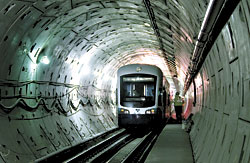Last week’s decision by the Sound Transit board to put a $23 billion proposal on the November ballot is testament to just how confident board members are about the public’s light-rail delusions. Even though the trains will serve a fraction of the voting public, the board is betting that in the face of $4 gasoline people will feel the need to do something, an urge that will outweigh their fear of big-money projects at a time of economic gloom.
The “light-rail = action” sales pitch we can expect in the coming months was perfectly embodied last week by Greg Nickels’ op-ed in the Seattle Times. It didn’t so much make a case for expanding light rail as pour scorn on anyone who would dare question the plan. According to Nickels, the time for questioning is over. It’s time (as it always is when a politician wants to tap voters for money) to move forward.
Which is fine for a large segment of the voting public. To the light-rail faithful, there’s nothing to discuss, and price isn’t relevant. You could say it’ll cost $100 billion to get to Northgate and they wouldn’t blink. Light rail is just something you do—other cities have it; of course Seattle should have it. People who live nowhere near the planned light-rail stops will nonetheless tell you they can’t wait for the convenience of light rail. But how will they get to it? Where will they park? What makes them vote for this thing that’ll be five miles away from where they live when they don’t take the bus that stops two blocks away? Who knows.
This is the choir to whom Nickels preached in his satiric op-ed, which offered “10 Lame Reasons to Delay Mass Transit.” (It was a retort to an accompanying piece by Ron Sims, who argued that new taxes should be put off and the package more heavily weighted toward bus service.) Nickels’ piece set up the customary false dichotomy: Our choice is between continuing to fill up the gas tank, sitting in congestion, paving over Puget Sound, standing in overcrowded buses, or…buying this $23 billion light-rail plan.
Talk about not moving forward. It drives me nuts every morning to be stuck on a packed Metro bus at one red light after the next, as single-occupancy vehicles whiz across (or, even worse, the intersection sits empty). How can we not be giving buses signal priority? Every single Metro rider could tell you 100 more ways to make riding that thing more useful, efficient, and appealing, as it travels through every nook and cranny of King County. But instead of expending political and financial capital on that, we’re supposed to pony up billions for a fixed line going alongside the freeways, where cars won’t be inconvenienced at all.
I’m really not dead-set against light rail. I actually voted for it in 1996. But that system hasn’t even opened yet. What exactly has Sound Transit proven since then that makes a massive expansion justified—that they can build less than they promised in a third more time than they said it would take? For those of us who aren’t true believers, it would be nice for Nickels, the chair of the Sound Transit board, to tell us what lessons have been learned. Has the Sounder commuter-rail service actually taken any cars off the road, for instance, or proven cost-effective relative to other options?
Instead we just get the snark, such as Lame Reason to Delay #8: “Local media need an infusion of advertising cash from a certain Eastside shopping center developer who wants another two years to tell you that freeways are still the best transportation for the region.” An oddly misplaced bit of sarcasm, since Sound Transit appears to be one of the biggest advertisers in town. (They’ve certainly got more billboards up than Kemper Freeman.)
Then there was Nickels’ Reason #4 to Delay: “Waiting for mass transit will give you time to bone up on the latest news about how our indecision and bad habits are torching the planet.” Funny, but this “reason” only succeeds in raising the awkward question of what exactly the global impact will be of a colossal 15-year construction project like light rail. How long will it be before the environmental benefits of this transportation alternative balance out the energy and resource consumption involved in building it? Decades? I’m not saying we shouldn’t do it, but if you want to talk about global-warming impacts, well…let’s talk about them.
I’d like to know exactly what problem this particular light-rail route is going to solve, why that problem is the one most in need of solving, and why light rail is the best answer to that problem. But I suspect we’re just going to hear the usual blather. “Light rail is going to get people out of their cars,” we’ll be told. (Which people? Says who?) And “we can’t build our way out of our transportation mess.” Except we can, it seems—not by building more freeways; by building this other thing.








